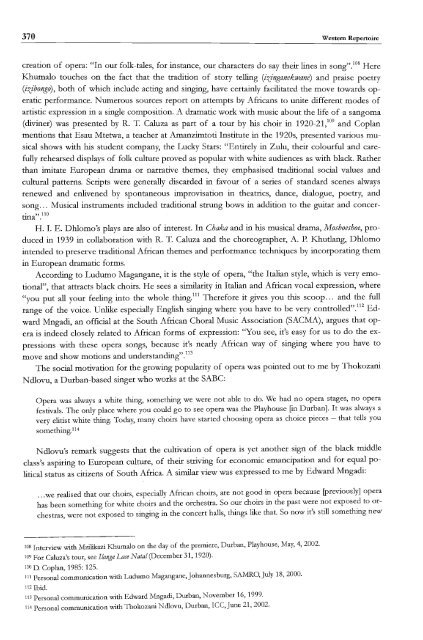South African Choral Music (Amakwaya): Song, Contest and the ...
South African Choral Music (Amakwaya): Song, Contest and the ...
South African Choral Music (Amakwaya): Song, Contest and the ...
Create successful ePaper yourself
Turn your PDF publications into a flip-book with our unique Google optimized e-Paper software.
370 Western Repertoire<br />
creation of opera: "In our folk-tales, for instance, our characters do say <strong>the</strong>ir lines in song".108 Here<br />
Khumalo touches on <strong>the</strong> fact that <strong>the</strong> tradition of story telling (izinganekwane) <strong>and</strong> praise poetry<br />
(izibongo), both of which include acting <strong>and</strong> singing, have certainly facilitated <strong>the</strong> move towards operatic<br />
performance. Numerous sources report on attempts by <strong>African</strong>s to unite different modes of<br />
artistic expression in a single composition. A dramatic work with music about <strong>the</strong> life of a sangoma<br />
(diviner) was presented by R. T. Caluza as part of a tour by his choir in 1920_21,109 <strong>and</strong> Coplan<br />
mentions that Esau Mtetwa, a teacher at Amanzimtoti Institute in <strong>the</strong> 1920s, presented various musical<br />
shows with his student company, <strong>the</strong> Lucky Stars: "Entirely in Zulu, <strong>the</strong>ir colourful <strong>and</strong> carefully<br />
rehearsed displays of folk culture proved as popular with white audiences as with black. Ra<strong>the</strong>r<br />
than imitate European drama or narrative <strong>the</strong>mes, <strong>the</strong>y emphasised traditional social values <strong>and</strong><br />
cultural patterns. Scripts were generally discarded in favour of a series of st<strong>and</strong>ard scenes always<br />
renewed <strong>and</strong> enlivened by spontaneous improvisation in <strong>the</strong>atrics, dance, dialogue, poetry, <strong>and</strong><br />
song... <strong>Music</strong>al instruments included traditional strung bows in addition to <strong>the</strong> guitar <strong>and</strong> concertina".110<br />
H. 1. E. Dhlomo's plays are also of interest. In Chaka <strong>and</strong> in his musical drama, Moshoeshoe, produced<br />
in 1939 in collaboration with R. T. Caluza <strong>and</strong> <strong>the</strong> choreographer, A. P. Khutlang, Dhlomo<br />
intended to preserve traditional <strong>African</strong> <strong>the</strong>mes <strong>and</strong> performance techniques by incorporating <strong>the</strong>m<br />
in European dramatic forms.<br />
According to Ludumo Magangane, it is <strong>the</strong> style of opera, "<strong>the</strong> Italian style, which is very emotional",<br />
that attracts black choirs. He sees a similarity in Italian <strong>and</strong> <strong>African</strong> vocal expression, where<br />
"you put all your feeling into <strong>the</strong> whole thing. 111 Therefore it gives you this scoop... <strong>and</strong> <strong>the</strong> full<br />
range of <strong>the</strong> voice. Unlike especially English singing where you have to be very controlled".112 Edward<br />
Mngadi, an official at <strong>the</strong> <strong>South</strong> <strong>African</strong> <strong>Choral</strong> <strong>Music</strong> Association (SACMA), argues that opera<br />
is indeed closely related to <strong>African</strong> forms of expression: ''You see, it's easy for us to do <strong>the</strong> ex<br />
pressions with <strong>the</strong>se opera songs, because it's nearly <strong>African</strong> way of singing where you have to<br />
move <strong>and</strong> show motions<br />
.<br />
an<br />
d<br />
un<br />
d<br />
erstan<br />
din<br />
g.<br />
,,113<br />
The social motivation for <strong>the</strong> growing popularity of opera was pointed out to me by Thokozani<br />
Ndlovu, a Durban-based singer who works at <strong>the</strong> SABC:<br />
Opera was always a white thing, something we were not able to do. We had no opera stages, no opera<br />
festivals. The only place where you could go to see opera was <strong>the</strong> Playhouse [in Durban]. It was always a<br />
very elitist white thing. Today, many choirs have started choosing opera as choice pieces - that tells you<br />
something. 114<br />
Ndlovu's remark suggests that <strong>the</strong> cultivation of opera is yet ano<strong>the</strong>r sign of <strong>the</strong> black middle<br />
class's aspiring to European culture, of <strong>the</strong>ir striving for economic emancipation <strong>and</strong> for equal political<br />
status as citizens of <strong>South</strong> Africa. A similar view was expressed to me by Edward Mngadi:<br />
...we realised that our choirs, especially <strong>African</strong> choirs, are not good in opera because [previously] opera<br />
has been something for white choirs <strong>and</strong> <strong>the</strong> orchestra. So our choirs in <strong>the</strong> past were not exposed to or<br />
chestras, were not exposed to singing in <strong>the</strong> concert halls, things like that. So now it's still something new<br />
108 Interview with Mzilikazi Khumalo on <strong>the</strong> day of <strong>the</strong> premiere, Durban, Playhouse, May, 4, 2002.<br />
109 For Caluza's tour, see Ilanga Lase Natal (December 31,1920).<br />
110 D. Coplan, 1985: 125.<br />
111 Personal communication with Ludumo Magangane,]ohannesburg, SAMRO,]uly 18, 2000.<br />
112 Ibid.<br />
113 Personal communication with Edward Mngadi, Durban, November 16, 1999.<br />
114 Personal communication with Thokozani Ndlovu, Durban, ICC,]une 21, 2002.

















